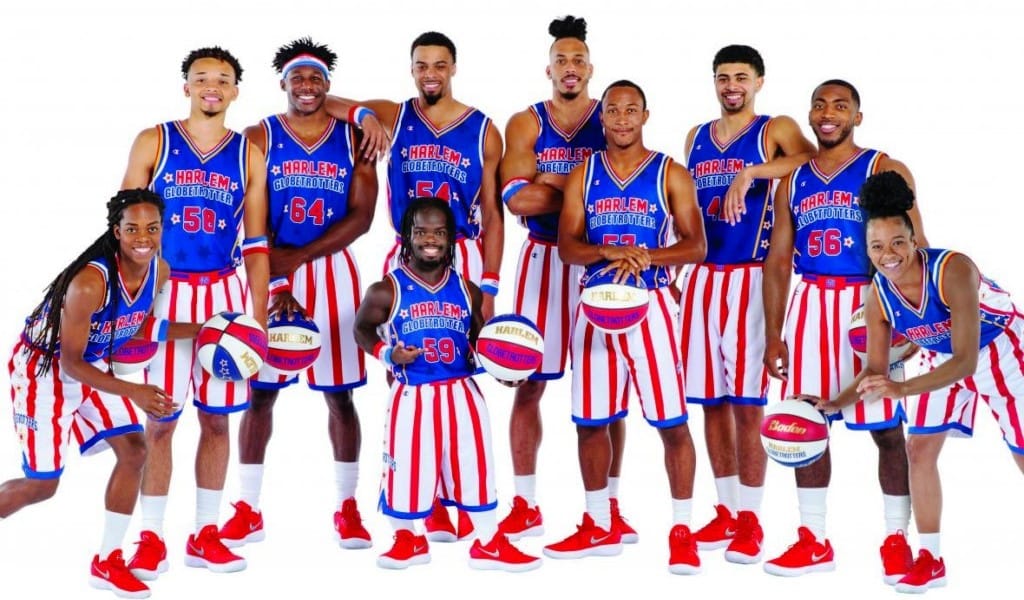The Harlem Globetrotters: a whirlwind of basketball wizardry, side-splitting comedy, and global icons. But behind the dazzling smiles and gravity-defying dunks lies a question that echoes through the minds of fans worldwide: How much do these basketball entertainers really make?
Journey with us as we unveil the secrets of the Harlem Globetrotters’ salaries, from their humble beginnings to their status as global entertainment moguls. We’ll delve into the factors that influence their paychecks, explore the unique ways they boost their income beyond the basketball court, and compare their earnings to those in the NBA and other professional leagues. Get ready to be surprised—the Globetrotters’ financial game is as impressive as their on-court magic!
From $40 to Six Figures: The Evolution of Globetrotter Paychecks
To understand the present, we must first rewind to the past. In the 1920s, the Harlem Globetrotters, then known as the Savoy Big Five, were just finding their footing. Players earned a modest $40 per week—a far cry from the lucrative contracts of today. As the team’s popularity soared, so did their paychecks.
A turning point came in the 1950s with the legendary Meadowlark Lemon. His groundbreaking $20,000 contract shattered expectations, proving that the Globetrotters were more than just athletes—they were entertainers worthy of substantial compensation. By the 1970s, Lemon was reportedly earning $100,000 per year (over $600,000 in today’s dollars!), cementing the Globetrotters’ financial ascent.
Breaking Down the Pay Scale: Rookies vs. Veterans
Today, the Harlem Globetrotters’ salary structure reflects a blend of experience, skill, and star power:
- Rookie Sensations: New recruits typically start with salaries ranging from $50,000 to $80,000 per year. This significant increase from the starting salaries of just a decade or two ago—around $30,000-$50,000 in the 2010s—showcases the team’s growing financial clout.
- Seasoned Showmen: Veteran Globetrotters, those who’ve honed their skills and captivated audiences for years, earn significantly more. Salaries in the $100,000 to $200,000 range are common, with some top players surpassing this benchmark.
- Superstar Status: Elite players, team captains, and fan favorites can command salaries exceeding $300,000, rivaling some international basketball leagues. These players often have additional responsibilities and opportunities that contribute to their higher earning potential.
Beyond the Baseline: How Globetrotters Supplement Their Income
Here’s the real slam dunk: The Harlem Globetrotters are masters at leveraging their brand and talent to create multiple income streams:
- Endorsement Powerhouse: The Globetrotters have a long history of lucrative endorsement deals. From classic partnerships with Greyhound, Chrysler, and Coca-Cola to more recent collaborations with Popeye’s and other major brands, these deals can bring in five to six figures annually for individual players.
- Globe-Trotting Gigs: Special events, tours, and exhibition games provide additional income opportunities. From their iconic 1981 TV special, “Harlem Globetrotters on Gilligan’s Island,” to countless appearances at schools, corporate events, and international tournaments, these one-time payments can add up significantly.
- Lights, Camera, Globetrotters!: TV appearances, both in commercials and dedicated shows, offer another avenue for financial gain. Meadowlark Lemon, for example, reportedly earned an estimated $300,000 per year from his starring role in “The Harlem Globetrotters Popcorn Machine.”
- Literary Legends: Many Globetrotters pen memoirs and inspirational books, sharing their unique experiences and insights with the world. These book deals can generate substantial royalties, especially for veteran stars with captivating stories to tell. Curly Neal’s “Meadowlark Memories” is a prime example.
- Merchandise Magic: From custom jerseys and basketballs to bobbleheads, posters, and more, Globetrotter merchandise flies off the shelves worldwide. Top players often receive a percentage of these sales, providing a passive income stream that complements their salaries.
Perks of the Job: More Than Just a Paycheck
Being a Harlem Globetrotter isn’t just about the money—it’s a lifestyle. Players enjoy an array of perks, including:
- All-Expenses-Paid Adventures: Travel, accommodations, meals—the Globetrotters take care of it all, allowing players to focus on what they do best.
- Style and Swagger: Custom-designed uniforms and warm-up gear ensure players look and feel the part both on and off the court.
- Living History: Access to the team’s legendary memorabilia collection is a perk few can boast.
- Cultural Ambassadors: Global travel exposes players to different cultures, cuisines, and experiences, broadening their horizons and creating lifelong memories.
- Bonds of Brotherhood: The camaraderie and friendships forged within the team are priceless. These bonds extend beyond the court, creating a supportive network that lasts a lifetime.
Globetrotter Salaries vs. the NBA and Other Leagues
While Globetrotter salaries aren’t quite on par with the NBA’s astronomical figures, they’re competitive within the global basketball landscape:
- NBA Elite: The average NBA player salary is a staggering $7.7 million, a testament to the league’s massive revenue and global viewership.
- WNBA Standouts: The average WNBA salary is approximately $120,000, reflecting the league’s continued growth and fight for pay equity.
- European Adventures: Top players in the EuroLeague, one of the most competitive leagues outside of the NBA, earn an average of $400,000 per year.
- Globetrotter All-Stars: The average salary for a veteran Harlem Globetrotter, considering additional income opportunities, is estimated to be around $150,000 or more.
The Future of Globetrotter Finances: A Slam Dunk?
As the Harlem Globetrotters continue to innovate, entertain, and expand their global reach, their earning potential seems limitless. Their unique blend of athleticism, comedy, and cultural impact has resonated with audiences for almost a century, proving that their brand of entertainment is timeless.
Will they ever achieve NBA-level salaries? While it’s unlikely in the near future due to the structural and financial differences between exhibition and professional league basketball, one thing is certain: The Harlem Globetrotters have found a winning formula that transcends borders, generations, and even the scoreboard. As long as they keep the ball bouncing, the laughter rolling, and the fans cheering, their financial future looks brighter than ever.
Did any Harlem Globetrotters Play the NBA?
Before Jackie Robinson broke baseball’s color barrier, the Harlem Globetrotters were already making history in the world of basketball. These talented athletes, often denied opportunities in the segregated NBA, used their platform to showcase their skills and challenge racial barriers. But their impact extended far beyond entertainment—they paved the way for the integration of the NBA and inspired generations of Black athletes.
The year was 1950. Chuck Cooper, a former Globetrotter with exceptional talent, was drafted by the Boston Celtics, becoming the first Black player to enter the NBA draft. That same year, Nat “Sweetwater” Clifton, another Globetrotter alum, made history when the New York Knicks purchased his contract for $12,500, making him the first Black player to officially sign an NBA contract.
These two pioneers, along with other Black players who followed in their footsteps, changed the face of basketball forever. The Globetrotters, with their reputation for exciting play and undeniable talent, had become a proving ground for Black athletes who were denied opportunities elsewhere. Their presence challenged the racist notions prevalent in the sport and paved the way for a more inclusive and equitable NBA.
The integration of the NBA was a monumental step towards racial equality in professional sports. The Globetrotters, by providing a platform for exceptional Black athletes like Cooper and Clifton, played a crucial role in this historic shift. Their legacy extends far beyond the court, serving as a reminder of the power of sports to transcend social barriers and challenge prejudice.
Are the Harlem Globetrotters Professional?
The Harlem Globetrotters: masters of trick shots, comedic timing, and, yes, professional basketball. Their unique blend of athleticism and entertainment has captivated audiences for almost a century, blurring the lines between sport and spectacle. This begs the question—are the Harlem Globetrotters really professional athletes?
The answer is a resounding yes. Here’s why:
- They’re Paid Professionals: The Globetrotters aren’t just out there for the love of the game (though that’s a big part of it!). They’re compensated for their performances, earning salaries just like players in the NBA or other professional sports leagues.
- Salary Structure: Their pay structure is similar to other professional teams, with rookie salaries between $50,000 and $80,000, veteran salaries in the $100,000 to $200,000 range, and top players potentially earning upwards of $300,000 or more per year.
- Beyond the Baseline: The Globetrotters’ income extends far beyond their base salaries. Endorsement deals, special appearances, merchandise sales, and other ventures can significantly boost their earnings, with top players potentially making over $1 million annually.
- A Global Brand: The Harlem Globetrotters are a globally recognized brand with a rich 95-year history. Their consistent performances, marketing prowess, and international appeal solidify their status as a professional organization.
While their on-court antics prioritize entertainment, don’t underestimate the Globetrotters’ basketball skills. These are highly skilled athletes who could likely hold their own against many professional teams. However, they’ve chosen a unique path that combines their love for the game with their passion for entertainment, creating a brand of basketball that’s both captivating and commercially successful.
More Than Just Entertainment
The Globetrotters’ story is inextricably linked to the history of racial segregation in America. Emerging during a time when Black athletes faced widespread discrimination and limited opportunities in professional basketball, the Globetrotters provided a platform for these talented individuals to showcase their skills and challenge societal norms. Their success demonstrated that Black athletes were not only capable but also marketable, paving the way for greater inclusion in the sport.
A Slam Dunk in the Business of Basketball
The Harlem Globetrotters have mastered the art of turning athleticism into a thriving business. Their unique selling proposition—a blend of high-flying basketball skills, comedic timing, and family-friendly entertainment—has resonated with audiences worldwide for generations. Their global reach is undeniable, having played in over 124 countries and territories. Through strategic marketing, branding, and merchandising, they’ve created a global empire that continues to thrive.
The Harlem Globetrotters are a testament to the power of combining passion, talent, and a sprinkle of showmanship to achieve professional success. They’ve redefined what it means to be a professional basketball player, proving that entertainment and athleticism can coexist—and generate significant income—on a global stage.
How much do the Washington Generals get paid?
Ah, the Washington Generals, the eternal rivals of the Harlem Globetrotters, forever locked in a dance of comedic defeats and skillful underestimation. While their on-court fate might be predetermined, the question of their salaries remains a mystery, shrouded in secrecy worthy of a Globetrotter trick shot.
Unlike their famous counterparts, who bask in the limelight of lucrative contracts and global recognition, the Washington Generals operate in a different financial reality. No official salary figures have ever been released, leaving fans and curious minds to speculate about the financial inner workings of the team that never wins.
While the Globetrotters enjoy the spoils of multi-million dollar endorsement deals and global tours, the Washington Generals’ earnings are likely a fraction of that. Considering a rookie Globetrotter can earn a starting salary between $50,000 to $80,000 per year, it’s safe to assume that the Generals, with their less prominent role, earn significantly less.
However, it’s crucial to remember that the Washington Generals are professional athletes who bring a unique skillset to the court. Their performance requires athleticism, comedic timing, and the ability to seamlessly blend into the Globetrotters’ carefully choreographed routines. Their salaries, however modest, reflect not only their athletic abilities but also their contribution to one of basketball’s most enduring legacies.
Despite their perpetual losing streak, the Washington Generals are an indispensable part of the Harlem Globetrotters experience. They are the foil to the Globetrotters’ mastery, injecting humor, unpredictability, and a touch of relatable struggle into every game. While their financial rewards may remain hidden, their contribution to the game is undeniable. They are a testament to the idea that sometimes, the most compelling narratives are those written in the margins of victory.
















